- Home
- Laura Purcell
The House of Whispers Page 3
The House of Whispers Read online
Page 3
I should like to rest forever. The refreshment has only increased my lethargy. My temples throb, whether from lack of sleep or lack of gin I cannot tell.
‘If not inconvenient.’ I dust off my hands, make to stand. ‘There are a few clothes I should like to unpack in my room.’
‘You’ll be sharing with Merryn.’
The chair leg squeaks on the floor. Impossible to conceal my dismay, but I try nonetheless. ‘Oh.’
‘ ’Tisn’t a large house,’ Mrs Quinn explains. She is watching me closely. ‘No spare beds. You’ll see that when I show you about.’
I simply nod.
A lady’s maid, an upper servant, sharing a bed! That is an insult in itself, but to be paired up with a lowly scullery maid . . . In Hanover Square I enjoyed a room of my very own, while maids like Merryn would bed down with straw in the kitchens.
I pick up my trunk and cast a glance over my shoulder at Merryn as we leave. She is smiling, merry as a grig. I do not dislike her. She seems an amiable girl. But surely even Cornish servants can comprehend how unusual this is? What an affront it must be to my pride?
A headache tightens its claws around the top of my scalp. Vision softens at the edges. I follow Mrs Quinn with little regard for that around me. She has promised a tour later – I will pay heed to the house then. For now I have simply to conquer these stairs, which seem like miniature cliffs in their own right. The iron banister lends some support, but it is charged with cold and burns my palm.
‘You’ve been travelling a good while,’ Mrs Quinn says. ‘ ’Tis three and twenty hours from Salisbury to Falmouth.’
‘Thereabouts. Thank you for booking me a seat inside. The expense . . .’
She clucks to stop my expressions of gratitude. ‘A body would freeze solid on the roof! Still, you do look pale.’
‘A little rest is all I require.’
‘Maybe I’ll heat some wine when I fetch you after breakfast. Bring the colour back to your cheeks.’
If she does not, I believe I shall weep.
We come to a corridor with windows on one side, the other interspersed with wooden doors. The white paint has chipped upon them, so I do not think they are used by the family. Mrs Quinn turns the brass doorknob of the second and says brightly, ‘Here we are.’
Pale green paper hangs upon the walls. That is a comfort I did not expect. There are few others besides.
Wooden slats on the floor. No fireplace. The bedstead appears to be made of oak and has seen better days; from the tidemarks on it, I would say it has been doused for bugs more than once. There is a window above with rough, unmatched curtains. It shows a view of the sea. The presence of the ocean still unnerves me, as it did when our trap scaled the cliff. It is so much bigger and more powerful than I imagined. It makes me feel cold.
To the left of the bed is a press for our clothes, to the right a washstand and ewer. One of each. I had more space when I shared a room with my sister Meg.
‘Thank you,’ I say. ‘I am sure I shall be most comfortable.’
But of course I shall not. Every movement I make will collide with Merryn. Her bright, sharp eyes will dig into all my secrets.
I place my trunk by the press, remove my bonnet and sit it on top. Already I feel hemmed in.
Mrs Quinn waits by the door. ‘You’d like some hot water, Miss Why?’
I would like her to go away.
‘Not for now, thank you.’ A yawn escapes me and I make the most of it, stretching theatrically. ‘I believe I will just close my eyes.’
‘That’s a sensible notion.’ But she is not moving. Worry folds her plump forehead. ‘Truly, you do look unwell. Rest up. I’ll return for you by and by.’ At last she withdraws. I have never seen someone leave a room so slowly. She shuts the door with such softness that I am not sure it is fully closed.
I pause for a moment, listening. Mrs Quinn does the same. It seems my patience is the greater, for presently, I hear the floorboards outside creak and her heavy steps fading away.
I take a breath, push the door to make sure it really is fastened. Then the tears come.
Once I made a noise when I wept. I remember racking sobs against Mother’s breast, snuffles on Meg’s shoulder. Not now. Teardrops flow down my face like moisture on the neck of a bottle. There are no ragged breaths, no bursts of passion. Weeping appears to be my habitual state.
Dropping onto the bed, I instinctively roll to the right. But that is not necessarily my place here. Which of these pillows is Merryn’s I cannot tell; both are equally flat and laced with the scent of dough.
Now both are also wet.
I am wasting precious time. Who knows when I shall next snatch a moment alone? Although it makes my aching head shriek, I force myself up and wipe my eyes with the heels of my hands.
I must check my trunk.
My fingers shake as I work the key into the lock and push the lid back on its hinges. The precious package falls into my hands, as if it has been waiting.
I unwrap the linen, layer by layer. A glimpse of rose-petal pink. Gold, flashing. Cold to the touch but warming, quickly, with the heat of my flesh.
Finally, the snuffbox sits in the palm of my hand.
Porcelain, tooled gold and the lingering ghost of Violet Strasbourg; these are my only relics of a former life. And it will cost my life, if I am caught with this box.
Sir Arthur, my previous master, is not a forgiving man. He possesses so much. He ought to spare me this one trinket. But I saw his advertisement in the newspaper. Ripped it out and stuffed it in my trunk, so that no one else might read the damning words.
Whereas Esther Stevens, maid to the advertiser, absconded Hanover Square in London on 17th December last, carrying off with her sundry items of her employer’s personal property including a pink porcelain snuffbox worked with gold. She is about five foot three inches tall, full of face though slender in person with light brown hair, and was wearing a grey stuff gown and black shawl. She is believed to have travelled West. Whoever apprehends this criminal will be thankfully requited. Whoever harbours her shall be prosecuted as the law directs.
Chapter 3
‘Miss Why? May I enter?’
Although the hand taps gently against wood, its sound reverberates in the base of my skull.
A door creaks. My eyes are gummed together. Rubbing them hurriedly, I gain a watery sort of vision. A large lady approaches me. She makes the air heavy, luxurious with a scent I cannot yet place.
‘Good to see you’ve slept. You’ll feel brighter now.’
Sleep crusts over my thoughts. On instinct, I raise myself to a sitting position and hold out my hands to receive the vessel she passes to me.
I recognise the aroma now: wine. It calls me back to myself.
‘Mrs Quinn. Forgive me, my wits are still gathering wool.’
She nods. ‘ ’Tis to be expected. You won’t have got much rest in the coach.’
This is true, but I did not expect a housekeeper’s sympathy for that. Mrs Glover in Hanover Square wouldn’t pity an underling unless their arm had fallen off, and even then she would do it grudgingly.
‘It was good of you to remember the wine.’
‘You need something to drive out that chill. I sent Lowena – that’s my other maid – out to collect the eggs. Poor girl came back stiff as a ramrod! She said there’s frost all over the rocks. Won’t be surprised if we have snow before long, and ’twill be a trial. You can imagine how difficult ’tis, Miss Why, perched up here when the roads are impassable.’
Greedily, I slop wine into my mouth. It has been warmed and spiced. Mrs Quinn does not make a remark about the rapidity with which I drink; she seems content chattering away.
‘I know you left London backalong, but have you seen the London papers? Dr Bligh – that’s our vicar – he gets them now and then. Told me that the
River Thames has frozen solid! Can you credit that?’
Her words form ice crystals inside me. Resolutely, I swallow the last sip of wine. ‘It makes me feel cold simply to imagine such a thing.’
Mrs Quinn believes I only quitted the capital to attend on my dying mother. In fact, Salisbury was simply the furthest destination I could reach with the money given to me by my sister. My actual parents, still alive, will be shivering along with the rest of the Londoners. Nursing their shame, wondering what has become of me.
Mrs Quinn offers me a gap-toothed smile. ‘Ready to be shown about? Thought I’d take you to meet the mistress first. That’s the most important.’
Running a hand over my head, I realise my hair has not been improved by lying upon a pillow. ‘Certainly. Let me first put on a cap and then I shall be ready.’
I hand Mrs Quinn my cup, hoping against hope she will decide to take it downstairs while I am tidying myself. She does no such thing.
She will be in the room when I open my trunk; there is no avoiding it. I think of the bloodstained clothing, the snuffbox.
‘Tell me about Miss Pinecroft.’ It is the brightest tone I have used all day and it rings false. Rising from the bed, I kneel down beside my trunk and put the key in the lock. ‘I believe you wrote that she has lived threescore years?’
‘I did. But she’ll appear much older to you, I daresay. ’Twas about a decade ago she had the last apoplectic fit and she hasn’t been the same since.’
Winching the lid of my trunk open a crack, I slip my hand inside and grope for a plain cap.
‘Miss Pinecroft can talk but she don’t choose to, much. We’ve tried all we can to perk her up. She don’t seem to want it. She prefers to . . .’ Mrs Quinn makes a vague gesture in the air, ‘. . . sit. I used to fancy she was going over all her fond memories, but they don’t seem to cheer her.’
Thank heaven, I have it. Pulling the cap out quickly, I slam the lid of my trunk back down. Mrs Quinn starts at the sound.
Her eyes linger on my luggage and I begin to feel that she is rifling through me, like the pages of a book.
‘I believe the muscles can be affected,’ I say quickly, jamming the cap over my hair. ‘You mentioned one side of her mouth was palsied, did you not? It may simply be that her face can no longer express her mood.’
I stand before her, smile, a little too widely.
‘Yes,’ she replies with a touch of wariness. ‘Happen you’re right. Let’s go down, and you can tell me what you think.’
It is a relief to leave that cramped room. Haggard daylight struggles through the windows in the corridor, casting patterns on the stone flags. At least the white paint gives an impression of space. Wind creeps along the walls outside. It sounds like a woman, pouring hushed secrets into her lover’s ear.
My ability to focus appears to have returned, and not a moment too soon. I must learn the layout of this house by heart in case I find myself less competent at another time. There is a strong likelihood that I shall. With the inn so far away and my hip flask dry . . . I must not dwell upon that. I shall contrive something, I always do.
Mrs Quinn leads me to the head of the staircase that descends into the stucco hall. Now my mind is clearer, I can appreciate the artistry. It really is a masterpiece; the engravings are pure as fresh fallen snow. I wonder how Merryn and Lowena manage to keep it clean.
Mrs Quinn pauses with a chink of her housekeeping keys. ‘No. I’ll show you the mistress’s bedchamber before taking you down.’
She continues to walk along the corridor. I see now that the landing and staircase serve as a divide between the wings: the east belonging to the servants and the west to the family.
The west wing is decorated in the style that I am used to. Rich mahogany panels the floors. The walls are papered in china blue, interset here and there with brass sconces for candles. Rosemary leavens the air with sharp lemony notes. My new mistress must have a great many gowns in storage.
Sound is intensified on this side of the house, which sits closer to the cliff edge. The wind scolds and is answered by a defensive mutter from the sea.
Yet that is not all I can hear. There is something low, resonating beneath.
I tilt my head. Yes, there.
For all its depth, it is sweet. There is a music to it. Something bewitching, humming right through me.
But Mrs Quinn jangles her keys, and the effect is shattered.
‘This one here. You’ll have your own copy of the key, remind me to give you that later.’
The lock on this door is peculiar. Brass, attached to the wood in the old way instead of a mortice mechanism. An engraved pointer dog extends its paw in the direction of a dial. As Mrs Quinn turns her key, it moves, and the dog’s paw indicates the number sixty-six.
A lock to detect the number of times a room is entered. Who would have purpose for such a thing? It implies distrust.
The door opens without a sound. I catch a breath, struck by what I glimpse behind it.
‘Yes,’ says Mrs Quinn, ‘ ’tis very handsome.’
Toile-de-Jouy dominates the room. A repeating pattern of blue pastoral figures against a white background. Not simply the paper and bed hangings but the dressing screen, the easy chair and the tiles around the fireplace. The result is overwhelming. Wherever my eyes turn, they meet objects picked out in blue: mostly shepherds and their sweethearts, but there are horses and trees besides.
‘I wonder Miss Pinecroft can sleep in such a chamber,’ I observe. ‘I should feel as though I were being watched!’
Little people. Was that not the term Merryn and Mrs Quinn used? They are here now, with their crooks and straw bonnets. Perhaps this room put such fancies into their heads.
‘The mistress don’t sleep overmuch,’ she replies sadly, hovering on the threshold. ‘We’re not always successful getting her to bed. I’ve known her spend the night downstairs, but I discourage it as much as I can, for ’tisn’t good for her health.’
‘No, indeed.’
There is no looking glass that I can see. A wardrobe lurks in the corner, and I must be right about the gowns in storage, for it radiates the scent of rosemary as strongly as a kitchen garden.
‘She don’t like to bathe if she can help it,’ Mrs Quinn explains. ‘Water turns her all queer.’
The look we exchange informs me that Mrs Quinn is aware of the irony. Why a woman who dislikes water should live on the cusp of the ocean, heaven only knows.
‘When the mistress do go to bed,’ she continues, ‘I’m afraid ’tis necessary to lock the door. She’s prone to wander, otherwise. Can’t have her trying to get back down that steep staircase in the dark. She needs spectacles, you see, but she won’t wear them. If we’re not careful, she’ll fall and break her head.’
A sensible precaution, of course, but it does not sit easily with me. I cannot wonder that Miss Pinecroft is reluctant to retire to bed if she knows she will be detained like a prisoner.
‘I understand, Mrs Quinn. I will make certain to lock the door.’ I nod to reinforce my words. The ghost of my headache wails. ‘Now, I should very much like to meet Miss Pinecroft herself.’
She stands aside to grant me passage back into the corridor. Then she closes the chamber, locks it. The brass dial turns to sixty-seven.
I wonder what she is locking it against.
Returning to the staircase, we descend sedately, admiring the stucco. It seems a great pretension for a house that is not, after all, particularly large.
Set in an alcove is the statue of a man. I suppose he must be Poseidon, with his draggled beard and the seaweed artfully arranged to lend him some modesty. He stares at me as I pass, his plaster eyes blank.
‘Do you know the history of this hall?’ I ask Mrs Quinn. ‘It appears to be straight from a ducal palace.’
She chuckles and pinks – no housekeeper is abo
ve a touch of flattery. ‘Only what Creeda told me. ’Twas fitted out just before the mistress moved in, by a man with grand ideas. They got less grand as his money ran out. Then his fortune was lost at sea.’
I imagine the waves taunting him on his failure. Sir Arthur too was what the beau monde called ‘nouveau riche’: his wealth, as well as his knighthood, came from success in trade. But he had rather more acumen than the man who built this house.
Sir Arthur knew every item in his home, and its worth.
My tongue is beginning to feel dry.
As I gain the stone floor, I see that Merryn has kept her word and scrubbed my footsteps from sight. This time we turn in the opposite direction, away from the enticing odours of the kitchen behind the baize door.
There is nothing remarkable in this corridor; the usual little pier tables and prints that denote a lady’s taste. Several doors stand ajar, leading, I imagine, to a dining room and a drawing room, but we do not stop at them. Mrs Quinn takes me right to the end of the wing.
This door is also partially open but no light spills from the gap. A twilit world awaits within, silent and still.
‘Here we are.’ Mrs Quinn hushes her voice.
My first thought is that we are disturbing something sacred. The room carries the air of an abandoned church, the same preternatural calm. Heavy, tasselled curtains conceal the view from the window, but they cannot muffle the sound of the sea.
I have never stepped inside a place so cold. It sucks the breath from me. There is no carpet or fire to add even a hint of warmth.
Dark mahogany panels the walls, yet this is only the background. Shielding the wood is an armoury of china.
Plates, sugar bowls, large, freestanding jugs either side of the ash-heaped fireplace. The mantelpiece is a series of shelves displaying vases, figurines and teapots. More china than I have ever seen in my life. There is a shelf of urns with matching lids, an arrangement of elegant cups too fine to drink from.
We walk right up to them, close enough to touch. Every piece is blue and white. No glass protects the collection.
‘Good morning, Miss Pinecroft.’ Mrs Quinn speaks gently, as if to raise her voice would shatter the display. ‘I’ve brought someone to see you.’

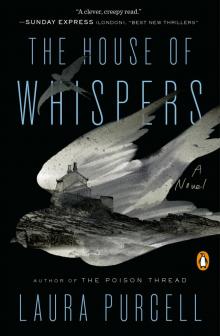 The House of Whispers
The House of Whispers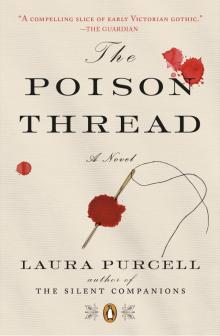 The Poison Thread
The Poison Thread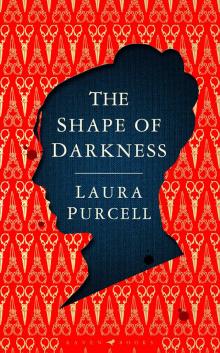 The Shape of Darkness
The Shape of Darkness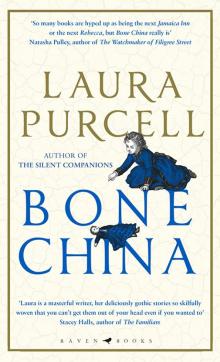 Bone China
Bone China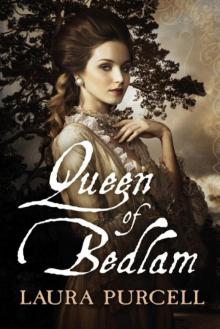 Queen of Bedlam
Queen of Bedlam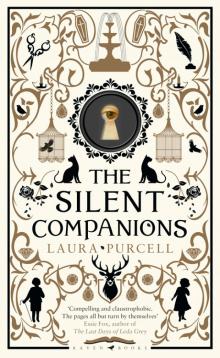 The Silent Companions
The Silent Companions